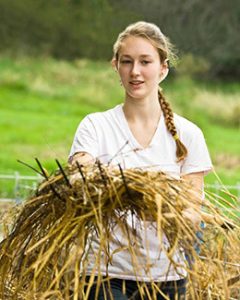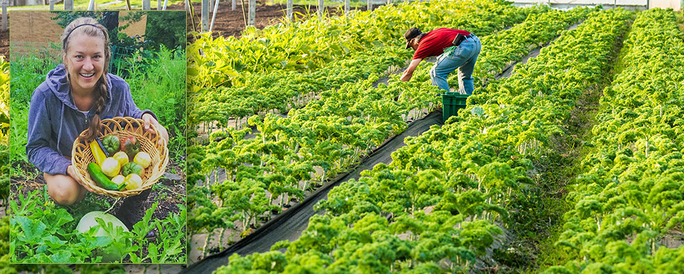Maharishi University of Management (MUM) in Fairfield, Iowa, is rolling out a first-of-its-kind 10-month certificate program in January 2017. The program is now accepting applications.
What Is Regenerative Organic Agriculture?
“A truly regenerative agriculture is one in which all the natural resources we use to produce food get renewed in the process of using them,” says Fred Kirschenmann, Distinguished Fellow at the Leopold Center for Sustainable Agriculture at Iowa State University, and a leader in the field of organic and regenerative agriculture.

An MUM student works in the organic garden
In learning this system of regenerative organic agriculture, you will be able to contribute powerfully to agricultural solutions that have far-reaching influence on major problems facing humanity today.
You Will Learn How To
- Draw down CO2 from the atmosphere and fix it in the soil
- Produce food efficiently without squandering nonrenewable, fossil carbon resources
- Reduce water use by building soil fertility and water-retention capacity
- Take part in the nourishing relationship that exists between the farmer, the community, and society
What Will You Get?
Upon completion of this program, you will receive:
- A certificate in Regenerative Organic Agriculture underwritten by the International Federation of Organic Agriculture Movements (IFOAM), the Biodynamic Association, and more
- Connections to national and international opportunities, including food hub internships, farm-to-table operations, and urban food programs
- Apprenticeship opportunities in organic and biodynamic farms in the United States and internationally in Nepal, Italy, Costa Rica, Bali, and other countries
“A truly regenerative agriculture is one in which all the natural resources we use to produce food get renewed in the process of using them.”
—Fred Kirschenmann, Distinguished Fellow at the Leopold Center for Sustainable Agriculture at Iowa State University.


Comments
YOU MAY ALSO LIKE
Education
This Innovative Building Produces More Energy Than It Uses
Few buildings are net-zero energy-users, but the Schwartz-Guich Sustainable Living Center at Maharishi University of Management puts theory into practice with its solar-powered, geothermal-heated, rain-catching, carbon-neutral building.
Education
New Medical School Program: Integrative Medicine Joins East & West
Dreaming of becoming a doctor who has mastered the best of both Eastern and Western medical knowledge? Here’s your chance to do so quickly and without stress.
Creativity & the Arts
Choose Love over Fear | 26:09
With true Carrey flair, Jim delivers a funny but inspiring speech to the students, parents, faculty, university administrators, and many others at Maharishi University of Management.
My Story
An Effortless Kind of Happy
"The first time I did TM, I felt like I had come home. Tears ran from my eyes because I felt so deep and so connected." —Antwan Penn, student at Maharishi University of Management